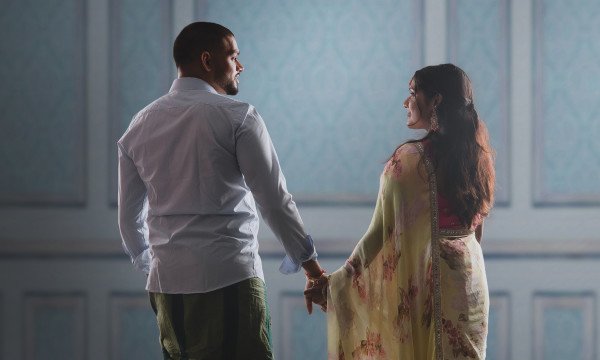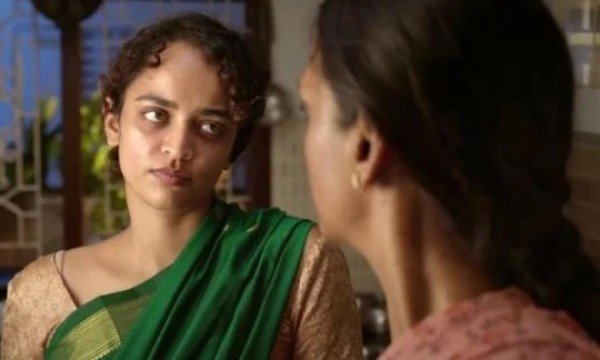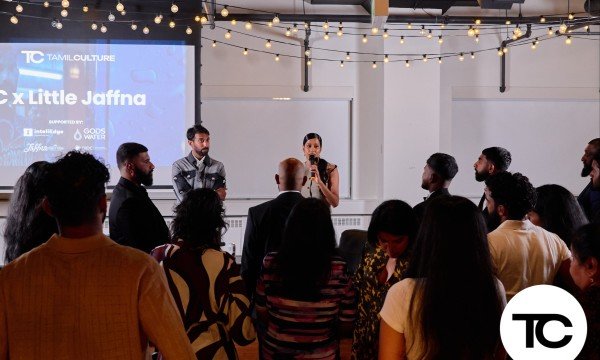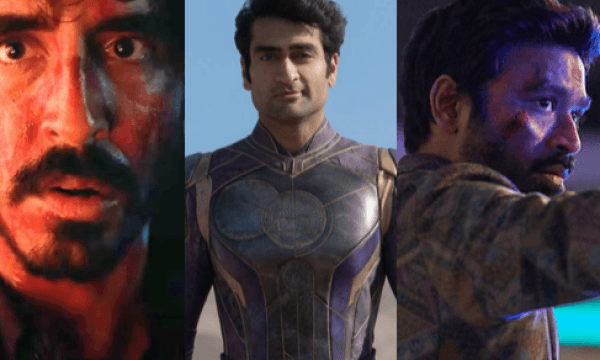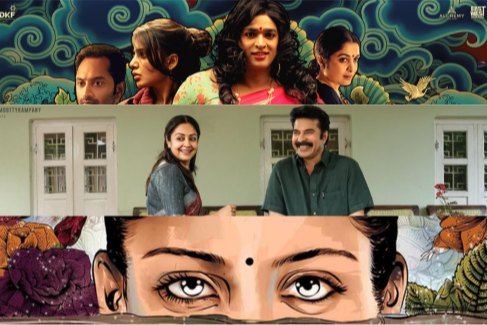
Tamil movies are often famously typecast as falling into predictable plot lines. We all know the Russell Peters bit about how typical Indian movies go in general - “guy and girl fall in love and can’t be together”. Aside from this stereotype, another take on Tamil movies I often hear is that they don’t discuss progressive ideals; that they continue to portray rigid gender roles and dramatic fight scenes, much like they did in the 1990s. The male lead is the hero, the female co-lead often gets little character development and is relegated to a passive supporting role, leading some audiences to often turn away.
Meet Tamil Singles! Check out myTamilDate.
Kaathal - The Core (2023)
This film starring Mammootty and Jyothika, explores the struggles of Mathew, a middle-aged bank manager who lives a double life as a closeted gay man in a small village community. He has a wife, Omana, and children. Mathew and Omana care about each other, but are both deeply unhappy at the state of their marriage, resulting in Omana seeking a divorce during Mathew’s local election campaign. The movie takes a very serious look at the familial challenges and unhappiness that Mathew faces as a result of his inability to be his true self. The election campaign forces Mathew to deny and deflect the rumours about him, and to face the unhappiness he has hidden for so long.
One of the most fascinating elements of the movie is its departure from the comedic portrayals that gay characters are often relegated to in Tamil movies. Rather than being kept a shameful secret or turned into a funny caricature, Mathew’s homosequality is discussed in depth. The movie indicates Mathew’s elderly father has always known about his sexuality. This is explored in the film, with Mathew expressing his resentment at his father, and his father in turn feeling remorseful for denying his son’s identity. In the end, the divorce goes through, but Mathew also comes out to his community, with his father’s support, and continues his election campaign, showing that his identity as a gay man is not something he will be ashamed of.
Super Deluxe (2019)
This film follows four intersecting storylines; one of these centres on Manickam, a man from a small village who abandoned his wife and child seven years previously. He returns to his eagerly awaiting family, but as a transgender woman named Shilpa, leading to shock and mockery in the small community. The film follows Shilpa as she faces harassment and unwanted attention, and the difficulty her wife, Jyothi, faces in understanding and coming to terms with such a change. However, Shilpa and Jyothi’s young son, Rasukutty, does not understand what the big deal is in his father being transgender. Having always seen his dad as his hero, the movie follows Rasukutty as he embraces Shilpa and tries to understand why she is “different” from other dads. It is a touching element of the movie, showing how a child’s lack of awareness of social constructs and expectations allows him to look past the judgement of others. Shilpa’s storyline ends not only with her son accepting her, but her wife also working past the confines of their community to accept her as well.
Aruvi (2017)
This film follows Aruvi, a girl in her 20s who comes on to a reality tv show to call out three men who had sexually assaulted her. The host and men all mock her story, until she discloses she has been HIV-positive for several years. She pulls out a gun and proceeds to take the entire tv-station hostage, during which she describes her diagnosis, being unable to work or study, her ostracization by her family, and how the three men took advantage of her vulnerable state by pretending to help her. The host of the show accuses her of putting the men in danger by not disclosing her condition earlier, and the film explores the intense stigma that both HIV-positive individuals and victims of assault face in society. While the film has some comedic elements, the exploration of stigma and discrimination are genuine, with several characters forced to look inwards and their own biases and values.
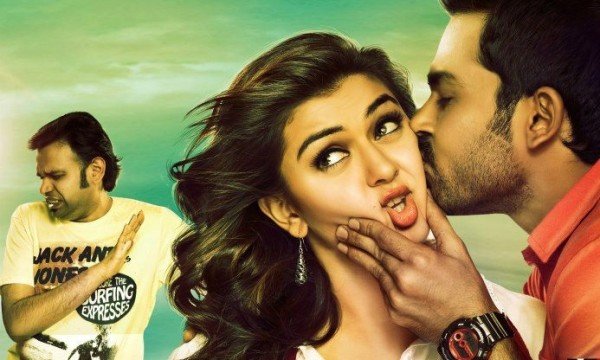 Why I Stopped Watching Tamil Movies I used to love watching Tamil movies. There was a time when these films seemed to have compelling storylines, and I enjoyed watching the lead actor ooze forced alpha male heroism out of every pore in his body. Meanwhile, the lead actress would wander around as if her sole purpose in life was to be the main actor’s trophy partner. TamilCulture.com
Why I Stopped Watching Tamil Movies I used to love watching Tamil movies. There was a time when these films seemed to have compelling storylines, and I enjoyed watching the lead actor ooze forced alpha male heroism out of every pore in his body. Meanwhile, the lead actress would wander around as if her sole purpose in life was to be the main actor’s trophy partner. TamilCulture.com
Margazhi Thingal (2023)
While this film’s caste-focused love story may seem fairly typical on the surface, the film takes these themes a step further by demonstrating just how deeply prejudices about caste can go, and how these values are increasingly at odds with many younger generations.
Kavitha, the main character, has a loving and close relationship with her grandfather, Ramaiyaa. Ramaiyaa is traditional, but is shown throughout as wanting the very best for Kavitha and approving of anything she wants. When Kavitha wishes to marry Vinod, a lower-caste man, Ramaiyaa has some hesitations but ultimately approves, and rejects the criticisms of others in the community, thereby seeming to confirm that he places Kavitha’s happiness above community perceptions. However, when suddenly presented with an opportunity by less open-minded community members to get rid of Vinod, it’s chilling just how quickly Ramaiyaa gives in and dismisses the life of a man he had accepted, revealing that despite his good nature, his deeply entrenched feelings of superiority are at the core of who he is.
The above-mentioned films stood out to me because of the fact that they are anything but typical. They may not be blockbusters or get as much traction as your typical action-packed romance stories, but if you are looking for films that tackle social issues and take a step away from the predictable love stories of the early 2000s, I hope this list jumpstarts your curiosity.
 Former Nike Product Director & Proud New Yorker, Sarah Sukumaran, Looking To Disrupt The Hypermasculine Sneaker Market With Her Female-Centric Brand Lilith "Despite a lot of data showing that women were outspending men in sneaker sales, I felt women consumers were still overlooked and underserved. Not much had changed since I was a young girl around colorways, styles, inclusive sizing. As grown women, most of us were still shopping in the men’s and grade school sizing sections. I had an idea in 2015 around changing the shopping experience and aggregating women’s sneaker styles." TamilCulture.com
Former Nike Product Director & Proud New Yorker, Sarah Sukumaran, Looking To Disrupt The Hypermasculine Sneaker Market With Her Female-Centric Brand Lilith "Despite a lot of data showing that women were outspending men in sneaker sales, I felt women consumers were still overlooked and underserved. Not much had changed since I was a young girl around colorways, styles, inclusive sizing. As grown women, most of us were still shopping in the men’s and grade school sizing sections. I had an idea in 2015 around changing the shopping experience and aggregating women’s sneaker styles." TamilCulture.com 



